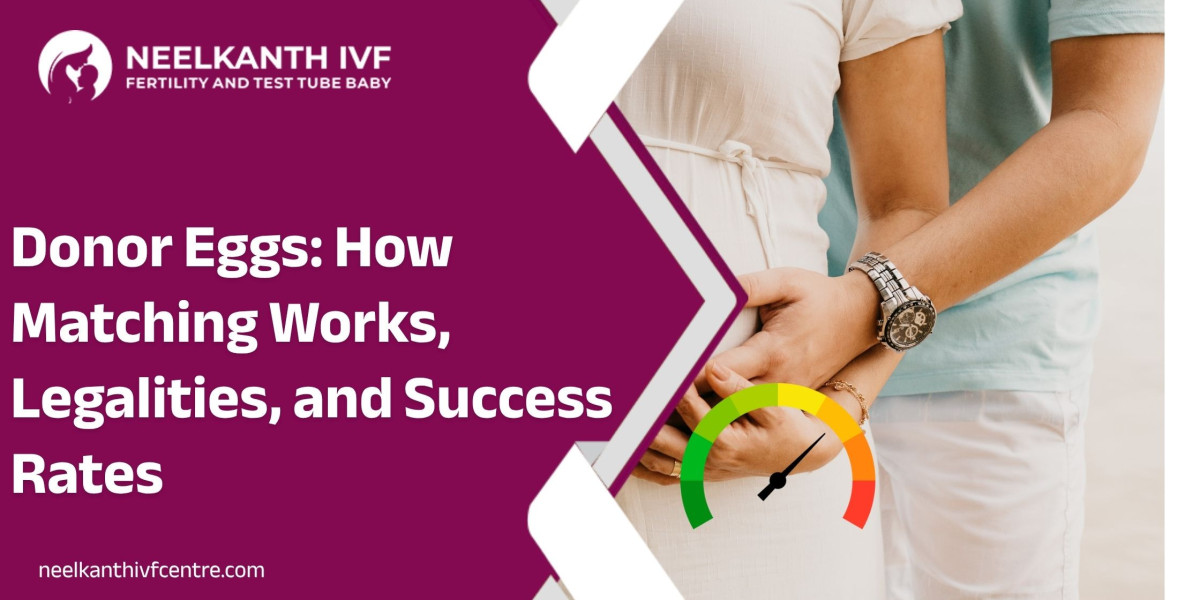For many couples and individuals facing challenges in conceiving, donor eggs have become a life-changing option offering renewed hope for parenthood. As the popularity of donor egg IVF continues to grow, understanding the process—from donor matching to legal considerations and success rates—becomes essential. Since many people also consider the cost of ivf treatment in india while evaluating their options, donor egg IVF serves as an important part of this decision-making process. With advancements in reproductive technology, donor egg programs are now more accessible, efficient, and successful than ever before.
Understanding Donor Egg IVF
Donor egg IVF is a fertility treatment in which eggs from a qualified donor are fertilized with sperm (from a partner or donor) and then transferred into the uterus of the intended mother. This treatment is widely recommended in cases such as:
Poor ovarian reserve
Premature ovarian failure
Age-related infertility
Genetic disorders
Repeated IVF failures
Because donor eggs typically come from healthy, younger women, success rates tend to be significantly higher than traditional IVF, making this option particularly appealing.
How Egg Donor Matching Works
A central component of the donor egg process is matching, ensuring compatibility between donor and recipient. Clinics follow strict, ethically guided procedures to guarantee safety, transparency, and comfort throughout this journey.
1. Donor Screening and Selection
Egg donors undergo a detailed evaluation that includes:
Medical history review
Hormonal testing
Genetic screening
Psychological assessments
Lifestyle evaluation
These steps ensure donors are physically and mentally fit for egg donation.
2. Matching Based on Recipient Preferences
Intended parents often choose donors based on characteristics such as:
Physical traits (skin tone, height, eye color)
Educational background
Personality
Hobbies and interests
Ethnicity or cultural compatibility
Some families prefer anonymous donations, while others choose open or semi-open arrangements depending on personal comfort and legal guidelines.
3. Synchronizing Cycles
In many cases, the donor’s and recipient’s menstrual cycles are synchronized to allow fresh embryo transfer. Alternatively, donors may freeze their eggs, giving recipients the flexibility to plan the timing of the transfer.
Legal Considerations: What You Need to Know
Laws surrounding donor eggs vary by country, and India follows a structured legal framework designed to protect both donors and intended parents.
Key Legal Guidelines in India
Voluntary Donation: Egg donation is strictly voluntary, and donors must provide written consent.
Anonymity: Donor identity typically remains confidential to protect privacy.
Age Restrictions: Egg donors must meet age criteria, usually between 21 and 35 years.
Compensation Rules: Compensation for donors is regulated to prevent unethical practices.
Parental Rights: Donors have no parental rights over children born through donor eggs.
Because the cost of ivf treatment in india varies depending on whether fresh or frozen donor eggs are used, legal regulations also help ensure that clinics maintain transparency in pricing and procedures.
Success Rates of Donor Egg IVF
Donor egg IVF boasts some of the highest success rates among all fertility treatments. This is largely because donor eggs come from young, medically screened women with optimal ovarian health.
What the Data Shows
Donor egg IVF can offer success rates of 60–75% per cycle, depending on the clinic and reproductive health of the recipient.
Women over 40 experience significantly higher success with donor eggs compared to using their own eggs.
Frozen donor eggs provide success rates comparable to fresh ones due to advancements in vitrification (fast-freezing technology).
Factors That Influence Success
Quality of donor eggs
Expertise of fertility specialists
Laboratory technology and embryo culture conditions
Uterine receptivity of the recipient
Sperm quality
For many couples, considering these factors alongside the cost of ivf treatment in india helps them choose the most effective and sustainable path forward.
Benefits of Donor Egg IVF
Choosing donor eggs offers numerous emotional and medical advantages:
1. Higher Chances of Pregnancy
Younger donor eggs significantly improve embryo quality and implantation rates.
2. Opportunity for Parenthood Despite Age or Ovarian Issues
Even women in their late 40s or early 50s can carry a pregnancy with medical guidance.
3. Genetic Screening Guarantees Healthier Embryos
Donors undergo intensive genetic testing, reducing the risk of hereditary disorders.
4. Emotional Fulfillment
Many women feel empowered by carrying and delivering the baby, even if the egg isn’t genetically theirs.
How to Choose the Right Clinic for Donor Egg IVF
Selecting the right fertility clinic is crucial for a safe, ethical, and successful donor egg experience. Here’s what to consider:
Clinic success rates
Donor screening standards
Transparency in procedures and pricing
Experience of fertility specialists
Availability of counseling support
Use of advanced technology (ICSI, vitrification, genetic testing)
A reputable clinic will guide you through every step—from donor matching to legal paperwork and embryo transfer—ensuring you feel supported throughout the process.
Conclusion
Donor egg IVF is a transformative option for individuals and couples dreaming of parenthood but facing fertility limitations. Understanding how donor matching works, the legal framework, and the success rates empowers you to make informed decisions. As you explore treatment pathways and evaluate the cost of ivf treatment in india, choosing a trusted fertility centre in india ensures access to advanced technology, expert guidance, and compassionate care. With the right support, the dream of creating or expanding a family becomes a beautiful, achievable reality.







